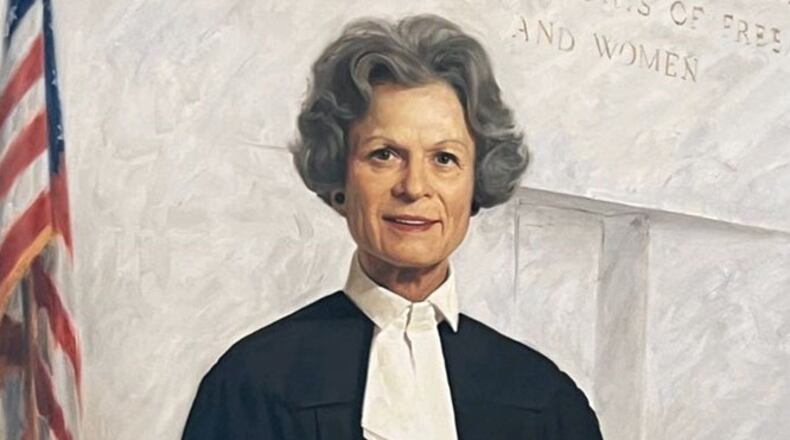Judge Dorothy Toth Beasley shattered glass ceilings in Georgia courts, argued landmark cases of national importance, helped establish Atlanta’s pioneering food-rescue project for the hungry and counted U.S. Supreme Court Justices Ruth Bader Ginsburg and Sandra Day O’Connor as friends.
“She was one of a kind,” said John Blend, a friend of 30 years. “She had an incredible ability to read and understand people. She had an empathy engine that raced while she had exquisite judgment.”
Beasley died May 19 at Emory Saint Joseph’s Hospital in Atlanta from a respiratory illness. She was 86.
Born Oct. 5, 1937, in Passaic, New Jersey, Beasley was raised in nearby Garfield with her younger sisters Virginia Toth Palmer and Stephanie Toth Wells. Their father, Stephen Toth, was an attorney and judge. Their mother, Beatrice Dodd Toth, a secretary.
Beasley was “the most giving, generous, unselfish person,” Wells said.
After studying American history and government and graduating in 1959 from St. Lawrence University in New York, Beasley briefly worked at the State Department in Washington, D.C. She then got a women’s scholarship to attend the American University Washington College of Law. At the time, women were generally not hired as attorneys and Beasley was one of only a few females in her class.
Upon graduating, she got a job clerking for judges in a trial court in Arlington, Virginia, then worked as an associate at the law firm Shadyac, Berg & Nolen. After marrying William Beasley in 1967, she moved with him to Atlanta, where she worked for the firm Fisher & Phillips.
“She was just extraordinary,” said Jenny Daley Peterson, a friend through the Lutheran Church of the Redeemer. “A huge intellect and the kindest woman.”
Beasley went to work for then-Georgia Attorney General Arthur Bolton, where she was assigned to the criminal division and argued five cases before the U.S. Supreme Court on the state’s behalf.
One of those cases, Doe v. Bolton, saw Georgia’s abortion law struck down on the same day in 1973 that the court decided its better known companion case Roe v. Wade. A year earlier, Beasley had argued the landmark Furman v. Georgia case, in which the Supreme Court invalidated all existing death penalty laws.
She often said that one of her proudest moments came when Bolton told her she was “a good lawyer, not a good lady lawyer.”
Beasley also served as a federal prosecutor in the Northern District of Georgia before becoming the first female judge of the Fulton County State Court in 1977, appointed by then-Gov. George Busbee. She spent seven years on the Fulton bench, introducing to the county the concept of community service as a criminal sentence.
In 1984, Beasley was appointed by then-Gov. Joe Frank Harris as the first woman on the Georgia Court of Appeals, becoming the state’s first female appellate judge. She became the court’s first female chief judge in 1995 and resigned four years later, having spent almost all her time on the bench surrounded by men.
Credit: courtesy
Credit: courtesy
“Judge Beasley was a brilliant jurist whose dedication to public service was renowned not just in Georgia, but across the world,” said Amanda Mercier, the appeals court’s current chief judge. “Her love of the law, her integrity, her wisdom and her independence were unmatched.”
As chief judge, Beasley added the words “and women” to the end of the court’s motto: “Upon the integrity, wisdom and independence of the judiciary depend the sacred rights of free men.”
Wells recalled taking dinner to her sister at the court one Thanksgiving, when Beasley spent the holiday in her office. She said it was typical of Beasley, who “didn’t know how to take a vacation and relax and do nothing.”
“She never stopped working,” Wells said.
After leaving the bench, Beasley briefly worked at the National Center for State Courts in Virginia, running its international division to enhance justice systems and services globally. She then returned to Atlanta and spent more than a decade as an arbitrator and mediator at Henning Mediation & Arbitration Service.
During that time, Beasley earned a Master of Laws degree in international law from Emory University School of Law and served with the United Nations International Criminal Tribunal for Rwanda. She received Emory Law’s trailblazer award in 2018 and two years later its award for lifetime commitment to public service.
Credit: Newton, Jonathan / AJC
Credit: Newton, Jonathan / AJC
Beasley’s charity work was extensive.
In the 1980s, she cofounded Atlanta’s Table, the project of the Atlanta Community Food Bank that provides hot meals for the hungry with food from the city’s restaurants, hotels and caterers. The concept was one of the first of its kind in the country.
Beasley served on multiple professional organizations and also helped to resettle refugees through Lutheran Services of Georgia, now known as Inspiritus. She supported civics education programs, advocated for public health, raised awareness of child sex trafficking, and hosted a writer’s roundtable at the Lenbrook senior community in Buckhead, where she lived from 2020.
“She never publicized herself or promoted herself in any way,” Blend said. “But her colleagues on the bench and in government all saw that still waters run deep.”
After meeting Blend at church, Beasley encouraged him to start the nonprofit Goshen Valley group home for foster children on his North Georgia farm. He said its success and expansion into a community ministry had Beasley’s “fingerprints all over it,” though she did not take a formal role.
“I really count Dorothy as central to what we’ve become,” he said. “Dorothy gave me confidence and the connections that we needed to prosper. She was tremendously unselfish in investing her time in her relationships.”
Beasley is survived by Wells, her youngest sister. She will be cremated and her funeral service will be held in July at the Lutheran Church of the Redeemer in Atlanta. Service details will be provided through the Whitley Garner At Rosehaven Funeral Home once confirmed.
About the Author
Keep Reading
The Latest
Featured






